
educhain
A Python package for generating educational content using Generative AI
Stars: 157
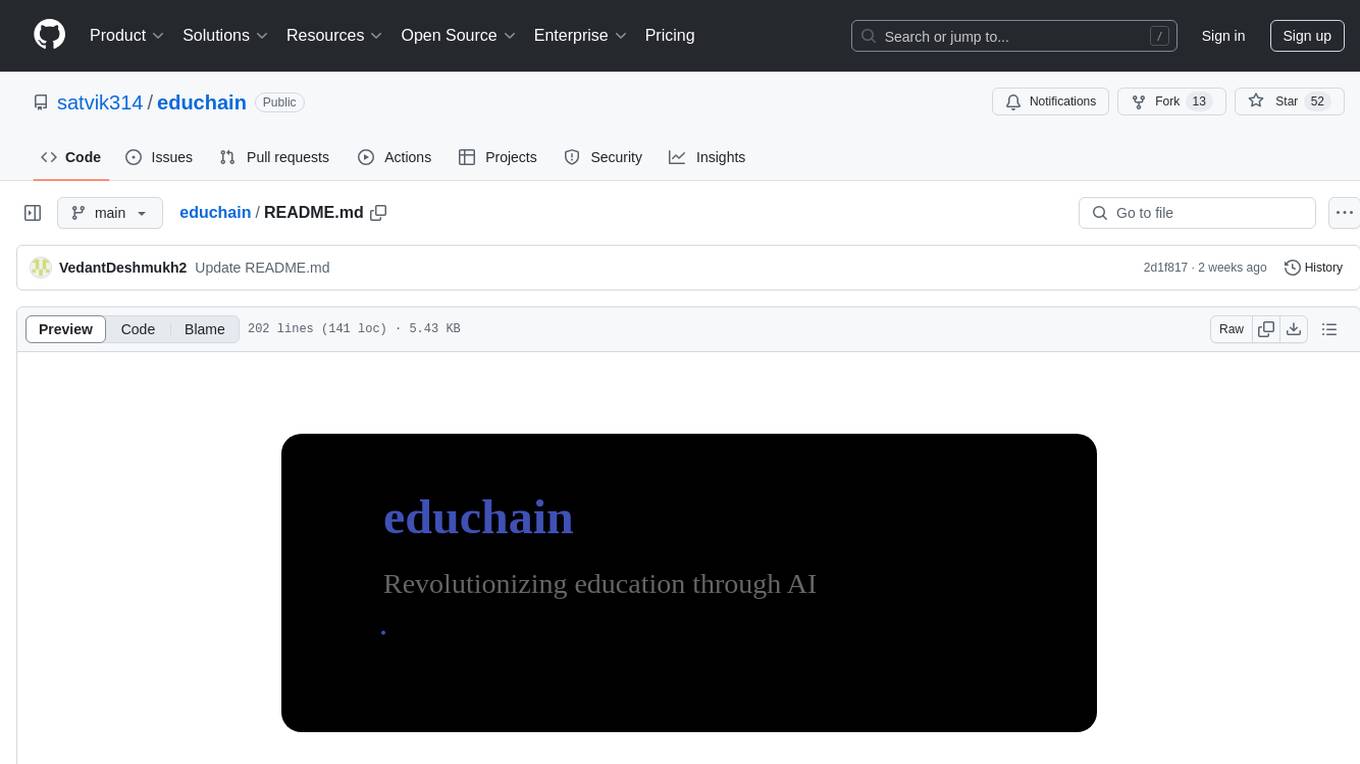
Educhain is a powerful Python package that leverages Generative AI to create engaging and personalized educational content. It enables users to generate multiple-choice questions, create lesson plans, and support various LLM models. Users can export questions to JSON, PDF, and CSV formats, customize prompt templates, and generate questions from text, PDF, URL files, youtube videos, and images. Educhain outperforms traditional methods in content generation speed and quality. It offers advanced configuration options and has a roadmap for future enhancements, including integration with popular Learning Management Systems and a mobile app for content generation on-the-go.
README:
Educhain is a powerful Python package that leverages Generative AI to create engaging and personalized educational content. From generating multiple-choice questions to crafting comprehensive lesson plans, Educhain makes it easy to apply AI in various educational scenarios.
- 📝 Generate Multiple Choice Questions (MCQs)
- 📊 Create Lesson Plans
- 🔄 Support for various LLM models
- 📁 Export questions to JSON, PDF, and CSV formats
- 🎨 Customizable prompt templates
- 📚 Generate questions from text/PDF/URL files
- 📹 Generate questions from YouTube videos
- 🥽 Generate questions from images
Educhain consistently outperforms traditional methods in content generation speed and quality:
pip install educhainGet started with content generation in < 3 lines!
from educhain import Educhain
client = Educhain()
ques = client.qna_engine.generate_questions(topic="Newton's Law of Motion",
num=5)
print(ques)
ques.json() # ques.dict()Generates different types of questions. See the advanced guide to create a custom question type.
# Supports "Multiple Choice" (default); "True/False"; "Fill in the Blank"; "Short Answer"
from educhain import Educhain
client = Educhain()
ques = client.qna_engine.generate_questions(topic = "Psychology",
num = 10,
question_type="Fill in the Blank"
custom_instructions = "Only basic questions")
print(ques)
ques.json() #ques.dict()To use a custom model, you can pass a model configuration through the LLMConfig class
Here's an example using the Gemini Model
from langchain_google_genai import ChatGoogleGenerativeAI
from educhain import Educhain, LLMConfig
gemini_flash = ChatGoogleGenerativeAI(
model="gemini-1.5-flash-exp-0827",
google_api_key="GOOGLE_API_KEY")
flash_config = LLMConfig(custom_model=gemini_flash)
client = Educhain(flash_config) #using gemini model with educhain
ques = client.qna_engine.generate_questions(topic="Psychology",
num=10)
print(ques)
ques.json() #ques.dict()Configure your prompt templates for more control over input parameters and output quality.
from educhain import Educhain
client = Educhain()
custom_template = """
Generate {num} multiple-choice question (MCQ) based on the given topic and level.
Provide the question, four answer options, and the correct answer.
Topic: {topic}
Learning Objective: {learning_objective}
Difficulty Level: {difficulty_level}
"""
ques = client.qna_engine.generate_questions(
topic="Python Programming",
num=2,
learning_objective="Usage of Python classes",
difficulty_level="Hard",
prompt_template=custom_template,
)
print(ques)Ingest your own data to create content. Currently supports URL/PDF/TXT.
from educhain import Educhain
client = Educhain()
ques = client.qna_engine.generate_questions_from_data(
source="https://en.wikipedia.org/wiki/Big_Mac_Index",
source_type="url",
num=5)
print(ques)
ques.json() # ques.dict()Create interactive and detailed lesson plans.
from educhain import Educhain
client = Educhain()
plan = client.content_engine.generate_lesson_plan(
topic = "Newton's Law of Motion")
print(plan)
plan.json() # plan.dict()- Multiple Choice Questions (MCQ)
- Short Answer Questions
- True/False Questions
- Fill in the Blank Questions
Educhain offers advanced configuration options to fine-tune its behavior. Check our advanced guide for more details. (coming soon!)
Educators worldwide are using Educhain to transform their teaching. Read our case studies to learn more.
Educhain's adoption has been growing rapidly:
- [x] Bulk Generation
- [x] Outputs in JSON format
- [x] Custom Prompt Templates
- [x] Custom Response Models using Pydantic
- [x] Exports questions to JSON/PDF/CSV
- [x] Support for other LLM models
- [x] Generate questions from text/PDF file
- [ ] Integration with popular Learning Management Systems
- [ ] Mobile app for on-the-go content generation
We welcome contributions! Please see our Contribution Guide for more details.
This project is licensed under the MIT License - see the LICENSE file for details.
- For general inquiries: educhain.in
- For technical support: [email protected]
- Follow us on Twitter
For bug reports or feature requests, please open an issue on our GitHub repository.
Made with ❤️ by Buildfastwithai
You can now copy and paste this directly into your project!
For Tasks:
Click tags to check more tools for each tasksFor Jobs:
Alternative AI tools for educhain
Similar Open Source Tools

educhain
Educhain is a powerful Python package that leverages Generative AI to create engaging and personalized educational content. It enables users to generate multiple-choice questions, create lesson plans, and support various LLM models. Users can export questions to JSON, PDF, and CSV formats, customize prompt templates, and generate questions from text, PDF, URL files, youtube videos, and images. Educhain outperforms traditional methods in content generation speed and quality. It offers advanced configuration options and has a roadmap for future enhancements, including integration with popular Learning Management Systems and a mobile app for content generation on-the-go.
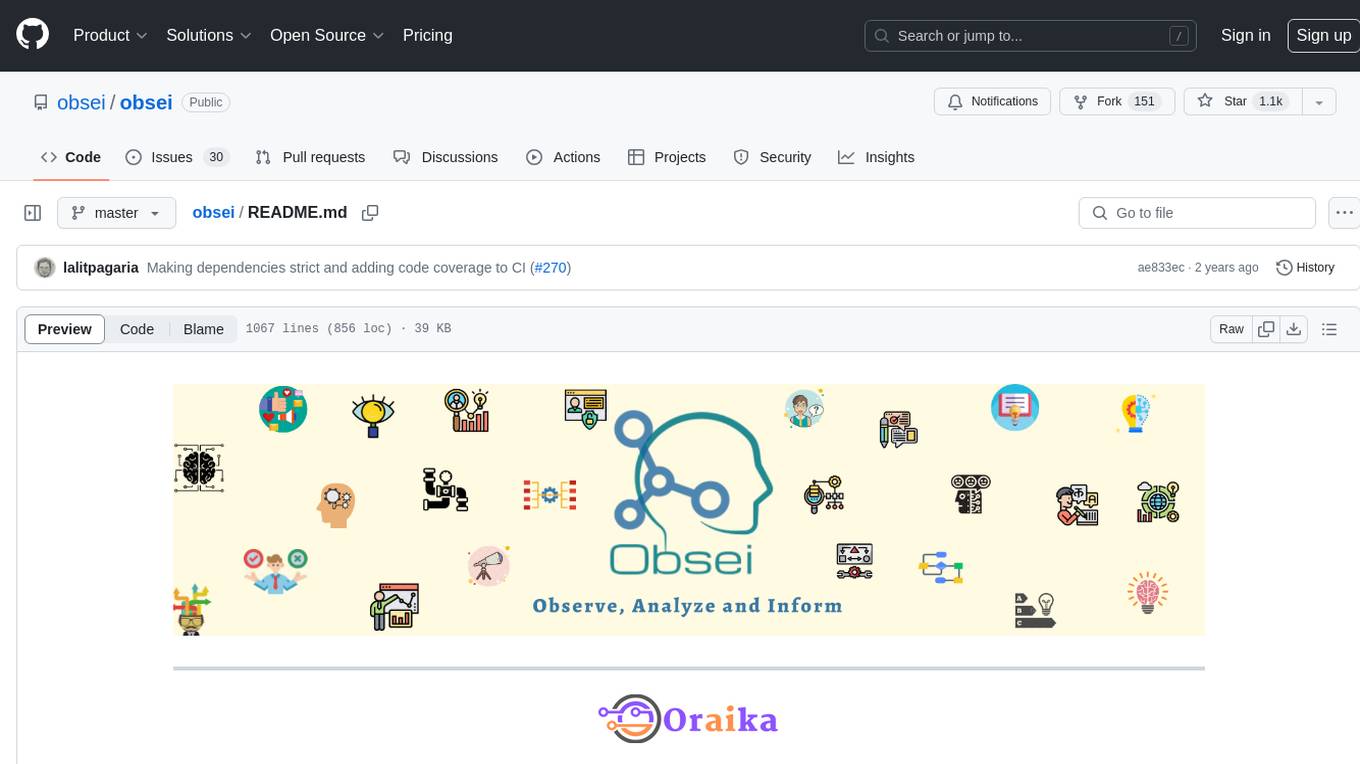
obsei
Obsei is an open-source, low-code, AI powered automation tool that consists of an Observer to collect unstructured data from various sources, an Analyzer to analyze the collected data with various AI tasks, and an Informer to send analyzed data to various destinations. The tool is suitable for scheduled jobs or serverless applications as all Observers can store their state in databases. Obsei is still in alpha stage, so caution is advised when using it in production. The tool can be used for social listening, alerting/notification, automatic customer issue creation, extraction of deeper insights from feedbacks, market research, dataset creation for various AI tasks, and more based on creativity.
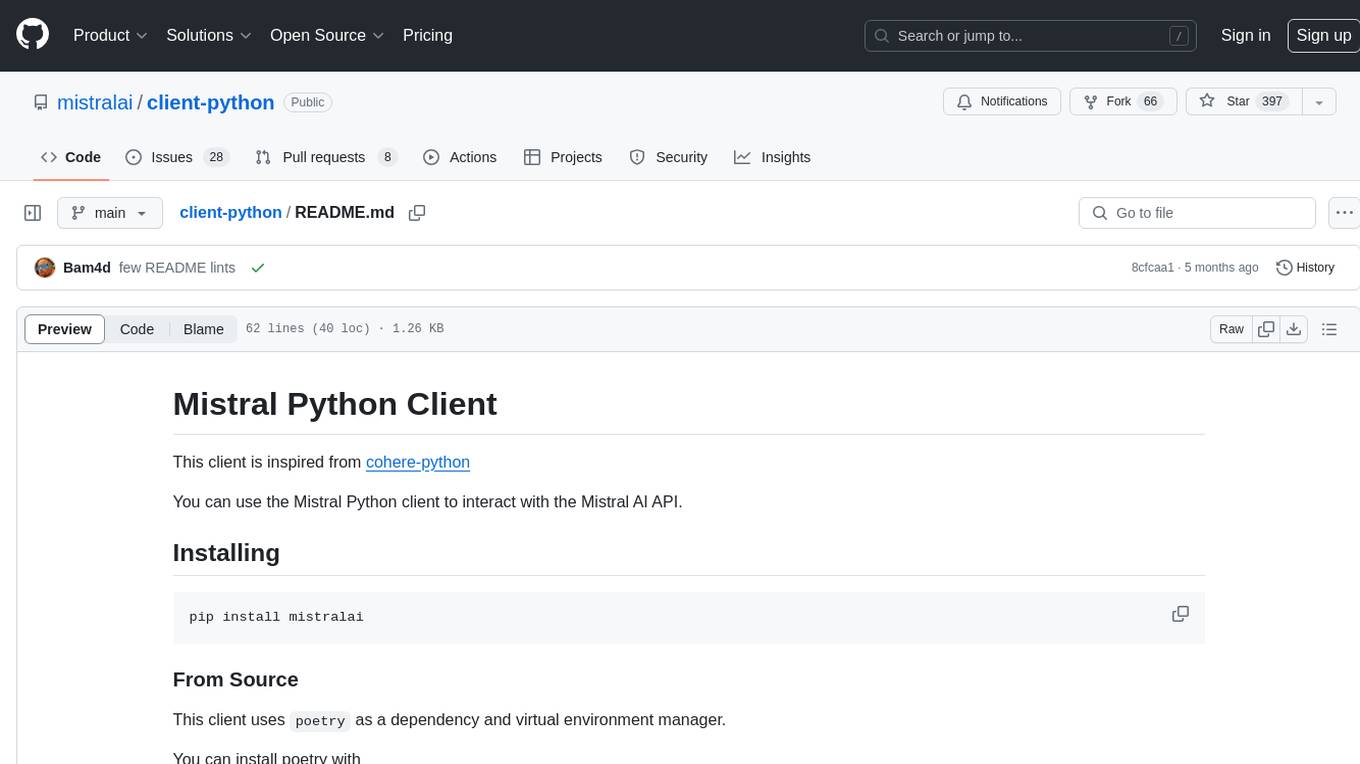
client-python
The Mistral Python Client is a tool inspired by cohere-python that allows users to interact with the Mistral AI API. It provides functionalities to access and utilize the AI capabilities offered by Mistral. Users can easily install the client using pip and manage dependencies using poetry. The client includes examples demonstrating how to use the API for various tasks, such as chat interactions. To get started, users need to obtain a Mistral API Key and set it as an environment variable. Overall, the Mistral Python Client simplifies the integration of Mistral AI services into Python applications.
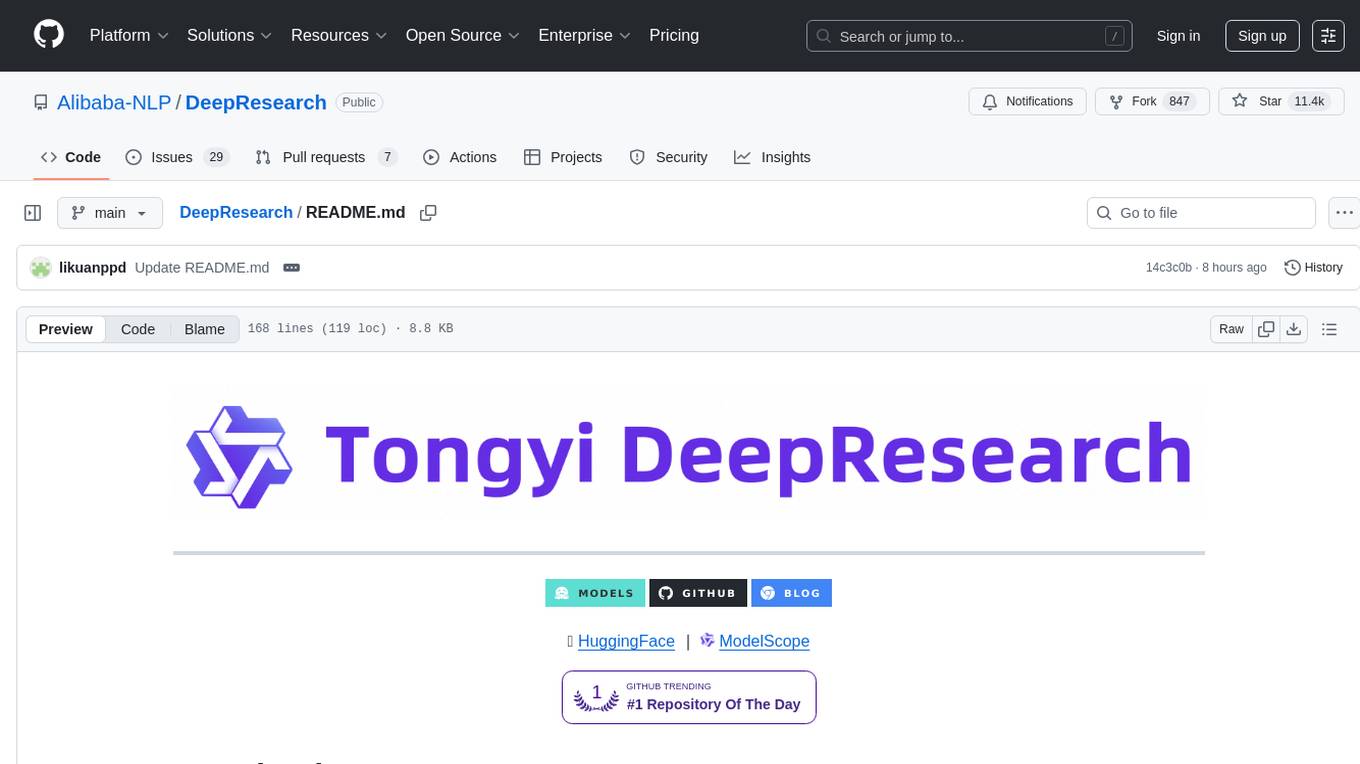
DeepResearch
Tongyi DeepResearch is an agentic large language model with 30.5 billion total parameters, designed for long-horizon, deep information-seeking tasks. It demonstrates state-of-the-art performance across various search benchmarks. The model features a fully automated synthetic data generation pipeline, large-scale continual pre-training on agentic data, end-to-end reinforcement learning, and compatibility with two inference paradigms. Users can download the model directly from HuggingFace or ModelScope. The repository also provides benchmark evaluation scripts and information on the Deep Research Agent Family.
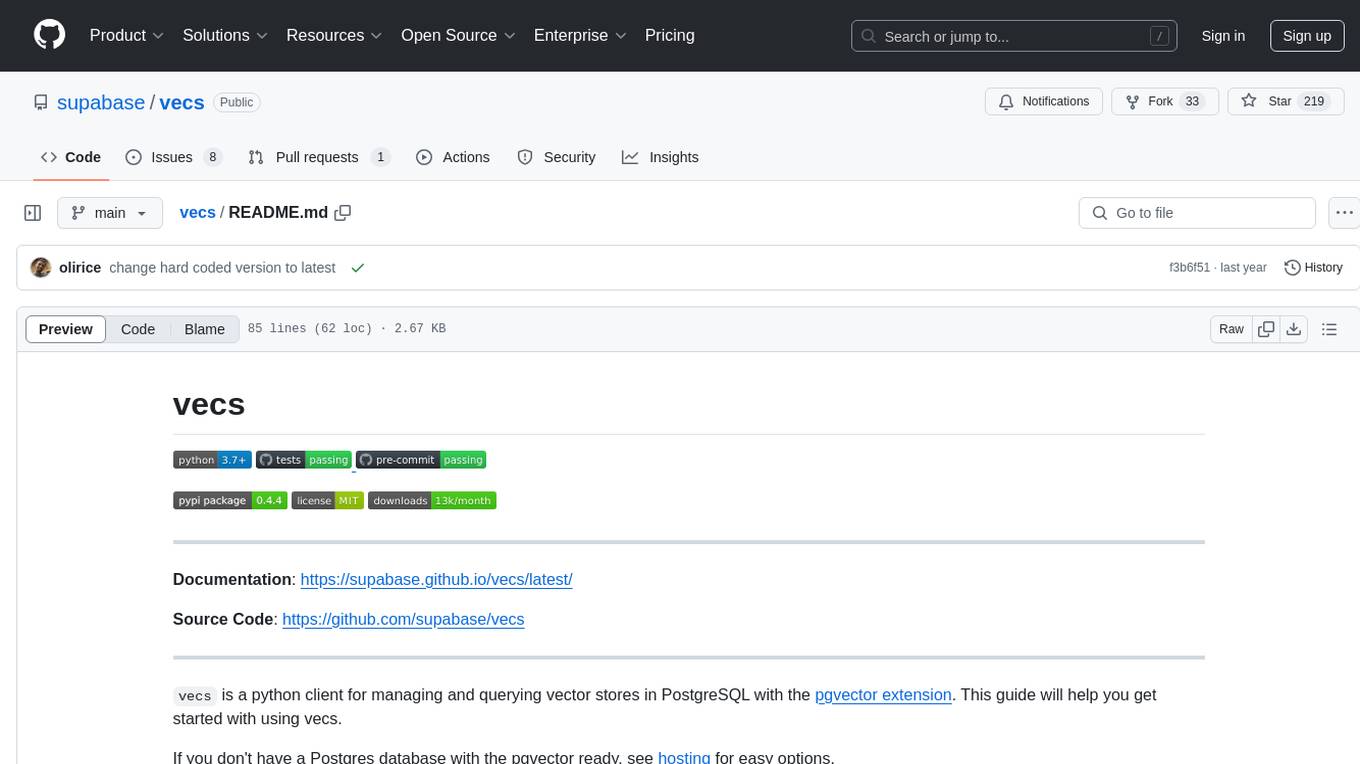
vecs
vecs is a Python client for managing and querying vector stores in PostgreSQL with the pgvector extension. It allows users to create collections of vectors with associated metadata, index the collections for fast search performance, and query the collections based on specified filters. The tool simplifies the process of working with vector data in a PostgreSQL database, making it easier to store, retrieve, and analyze vector information.
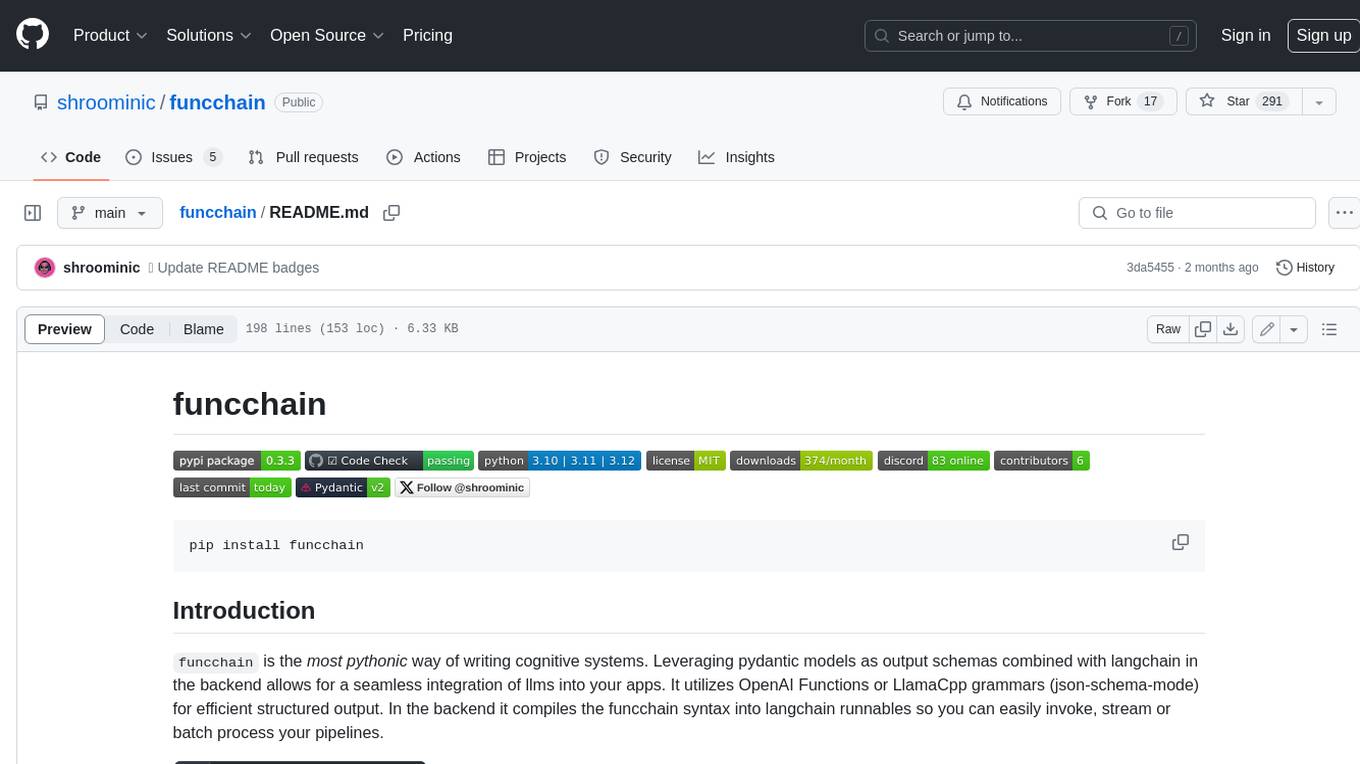
funcchain
Funcchain is a Python library that allows you to easily write cognitive systems by leveraging Pydantic models as output schemas and LangChain in the backend. It provides a seamless integration of LLMs into your apps, utilizing OpenAI Functions or LlamaCpp grammars (json-schema-mode) for efficient structured output. Funcchain compiles the Funcchain syntax into LangChain runnables, enabling you to invoke, stream, or batch process your pipelines effortlessly.
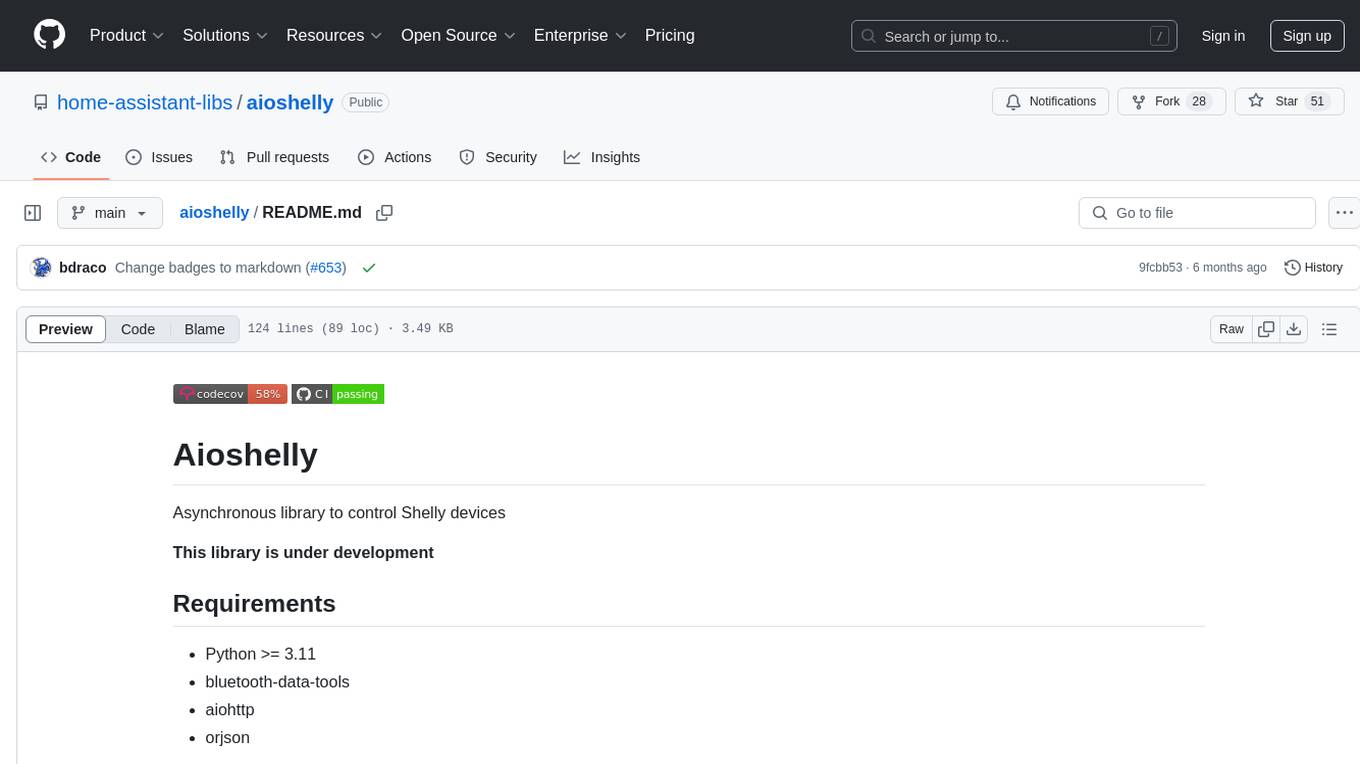
aioshelly
Aioshelly is an asynchronous library designed to control Shelly devices. It is currently under development and requires Python version 3.11 or higher, along with dependencies like bluetooth-data-tools, aiohttp, and orjson. The library provides examples for interacting with Gen1 devices using CoAP protocol and Gen2/Gen3 devices using RPC and WebSocket protocols. Users can easily connect to Shelly devices, retrieve status information, and perform various actions through the provided APIs. The repository also includes example scripts for quick testing and usage guidelines for contributors to maintain consistency with the Shelly API.
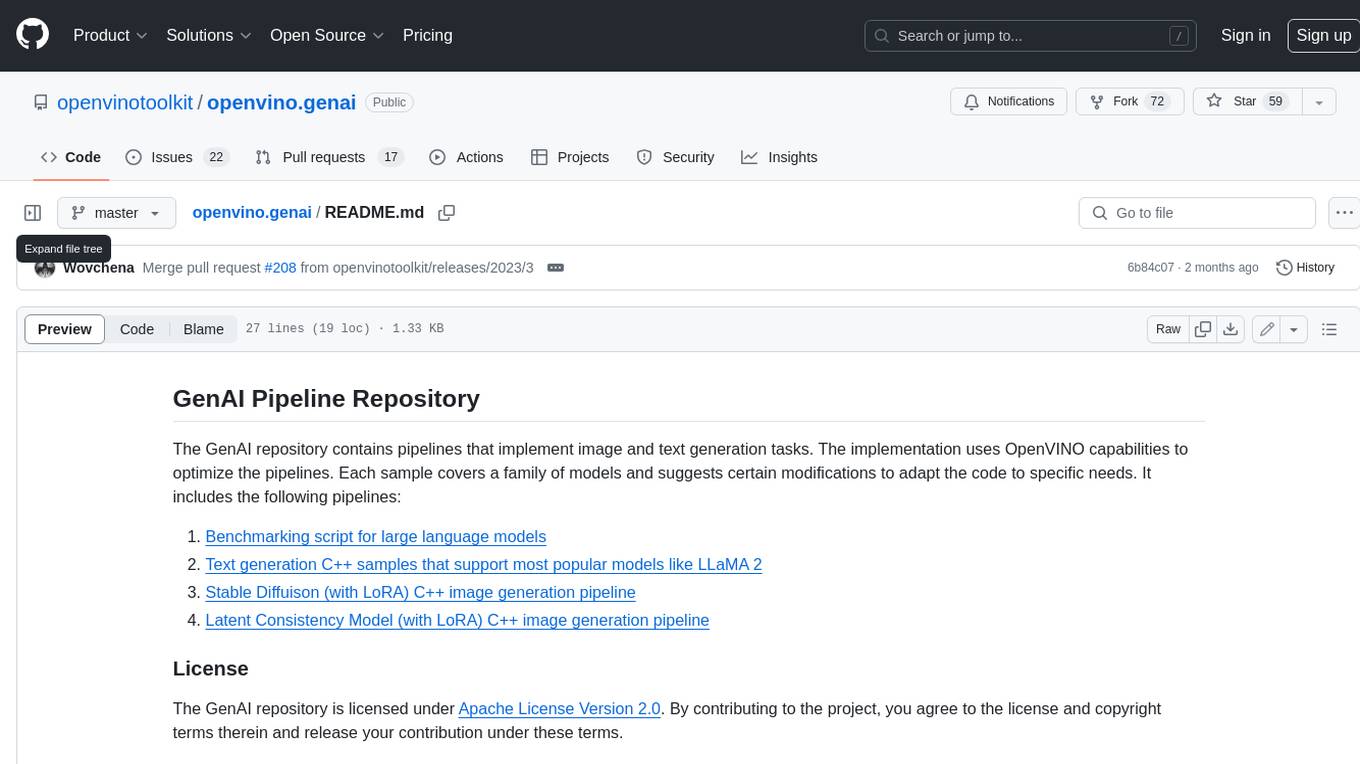
openvino.genai
The GenAI repository contains pipelines that implement image and text generation tasks. The implementation uses OpenVINO capabilities to optimize the pipelines. Each sample covers a family of models and suggests certain modifications to adapt the code to specific needs. It includes the following pipelines: 1. Benchmarking script for large language models 2. Text generation C++ samples that support most popular models like LLaMA 2 3. Stable Diffuison (with LoRA) C++ image generation pipeline 4. Latent Consistency Model (with LoRA) C++ image generation pipeline
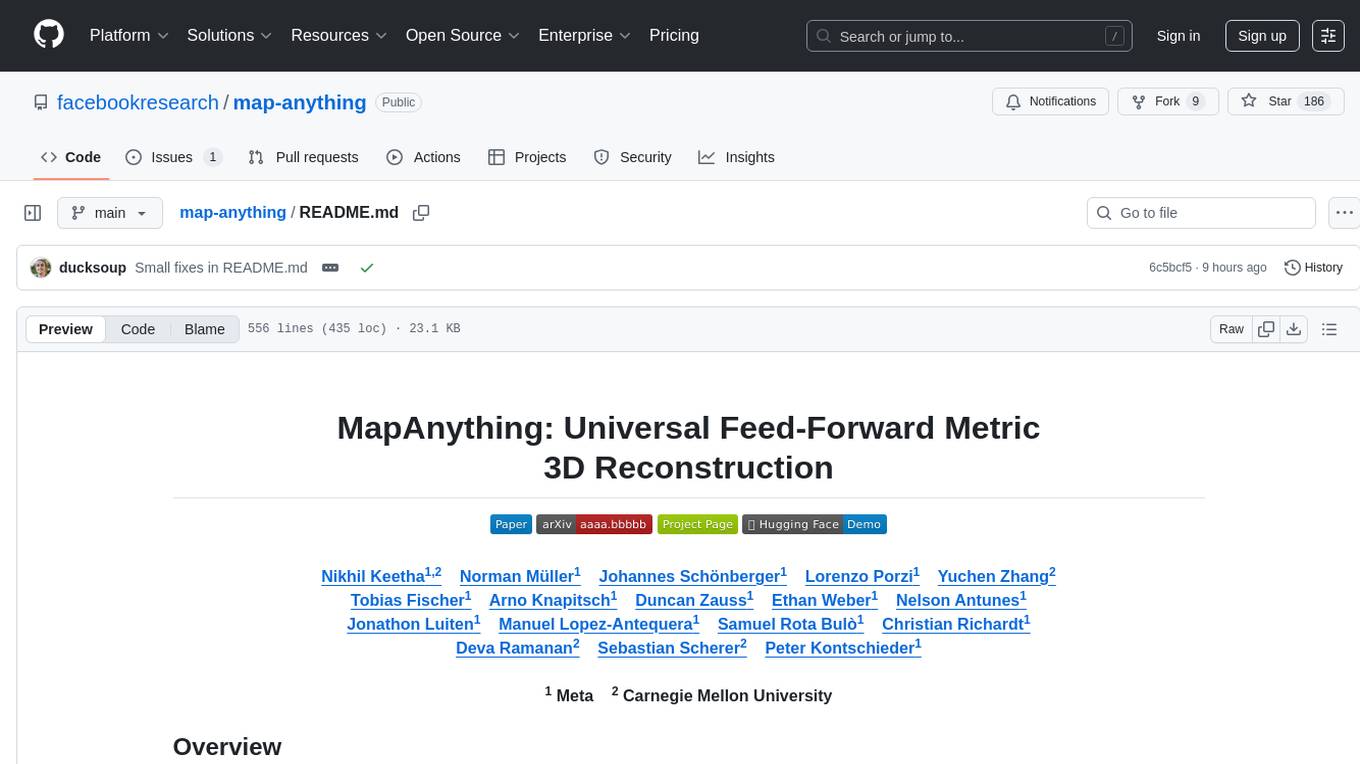
map-anything
MapAnything is an end-to-end trained transformer model for 3D reconstruction tasks, supporting over 12 different tasks including multi-image sfm, multi-view stereo, monocular metric depth estimation, and more. It provides a simple and efficient way to regress the factored metric 3D geometry of a scene from various inputs like images, calibration, poses, or depth. The tool offers flexibility in combining different geometric inputs for enhanced reconstruction results. It includes interactive demos, support for COLMAP & GSplat, data processing for training & benchmarking, and pre-trained models on Hugging Face Hub with different licensing options.
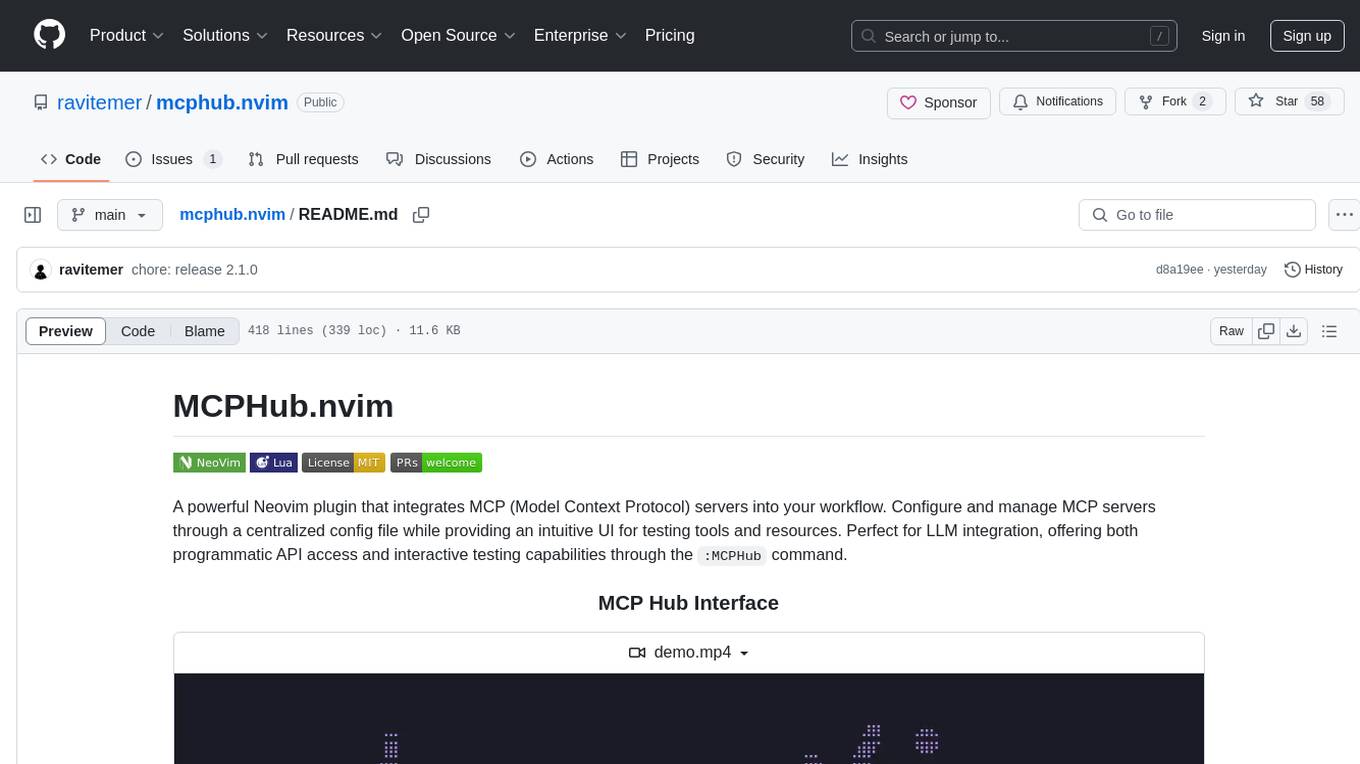
mcphub.nvim
MCPHub.nvim is a powerful Neovim plugin that integrates MCP (Model Context Protocol) servers into your workflow. It offers a centralized config file for managing servers and tools, with an intuitive UI for testing resources. Ideal for LLM integration, it provides programmatic API access and interactive testing through the `:MCPHub` command.
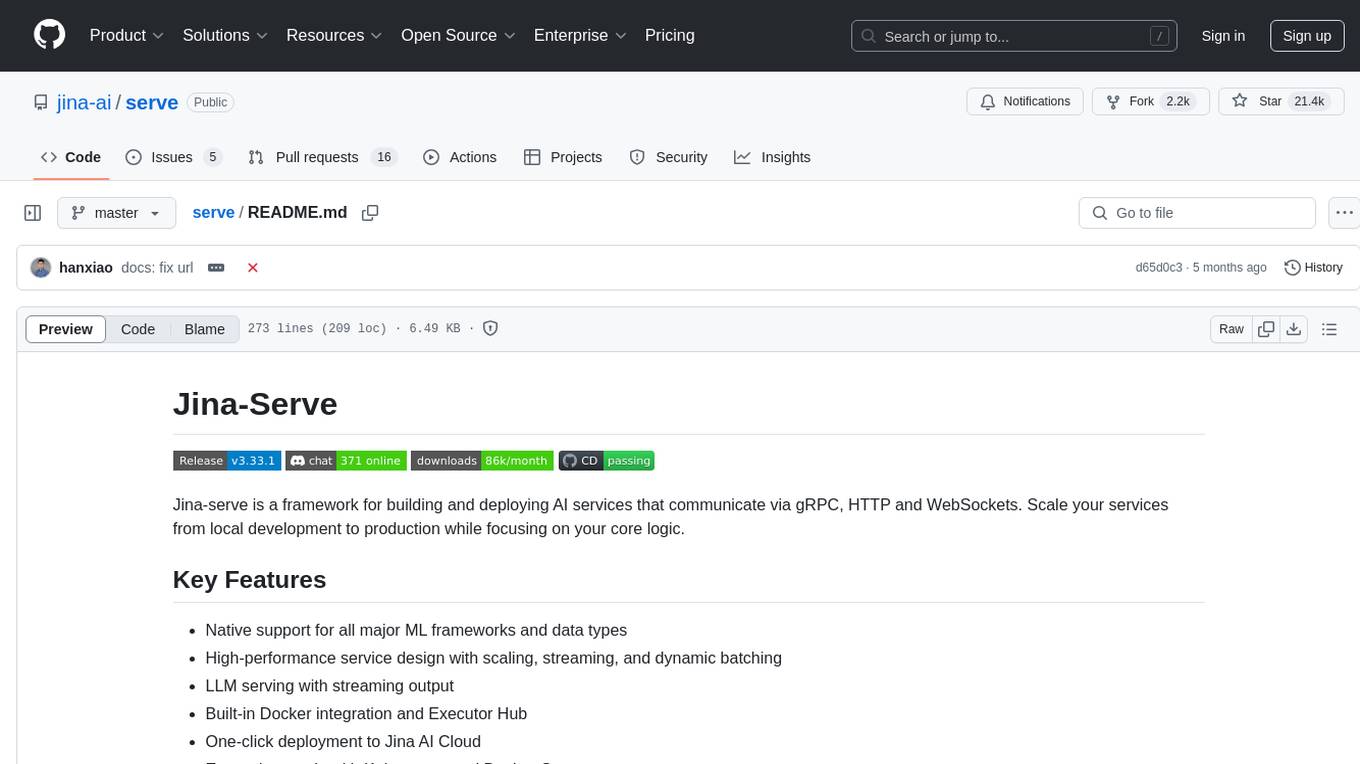
serve
Jina-Serve is a framework for building and deploying AI services that communicate via gRPC, HTTP and WebSockets. It provides native support for major ML frameworks and data types, high-performance service design with scaling and dynamic batching, LLM serving with streaming output, built-in Docker integration and Executor Hub, one-click deployment to Jina AI Cloud, and enterprise-ready features with Kubernetes and Docker Compose support. Users can create gRPC-based AI services, build pipelines, scale services locally with replicas, shards, and dynamic batching, deploy to the cloud using Kubernetes, Docker Compose, or JCloud, and enable token-by-token streaming for responsive LLM applications.
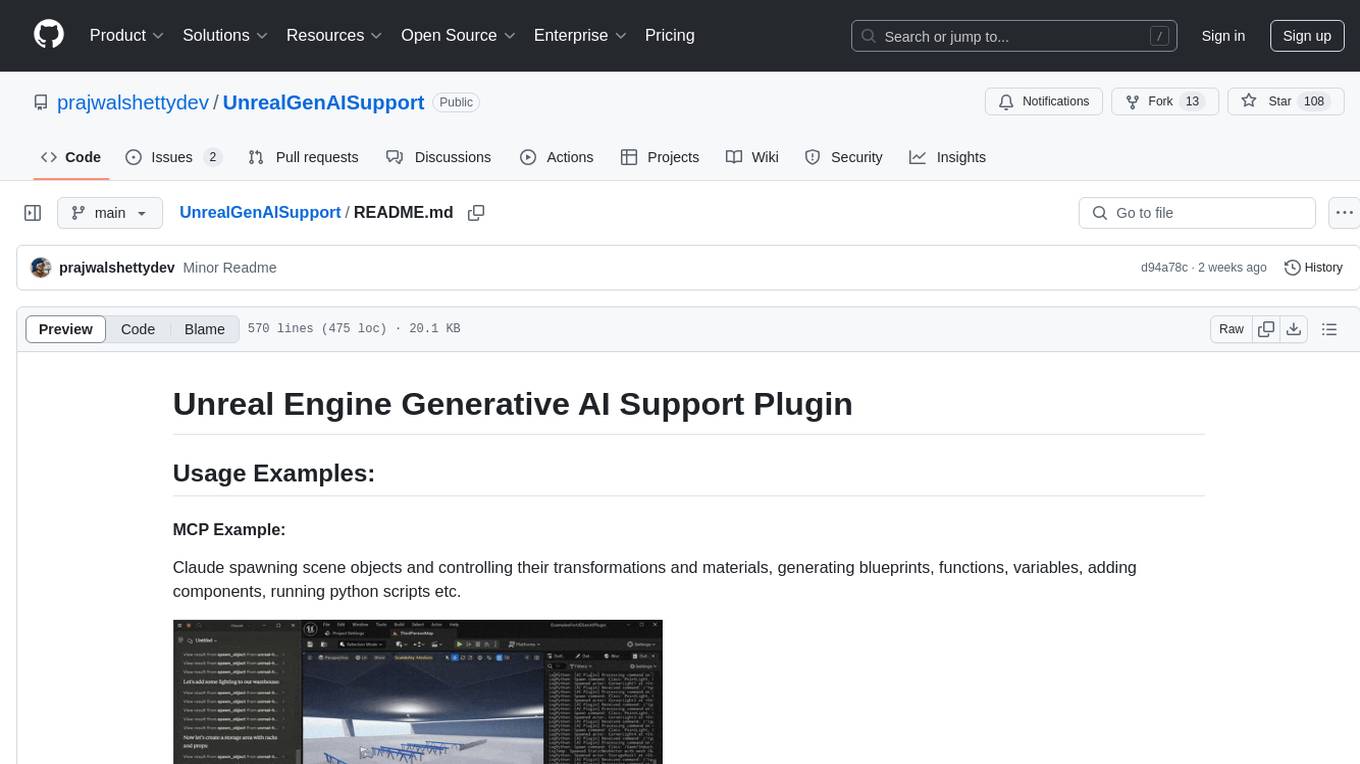
UnrealGenAISupport
The Unreal Engine Generative AI Support Plugin is a tool designed to integrate various cutting-edge LLM/GenAI models into Unreal Engine for game development. It aims to simplify the process of using AI models for game development tasks, such as controlling scene objects, generating blueprints, running Python scripts, and more. The plugin currently supports models from organizations like OpenAI, Anthropic, XAI, Google Gemini, Meta AI, Deepseek, and Baidu. It provides features like API support, model control, generative AI capabilities, UI generation, project file management, and more. The plugin is still under development but offers a promising solution for integrating AI models into game development workflows.
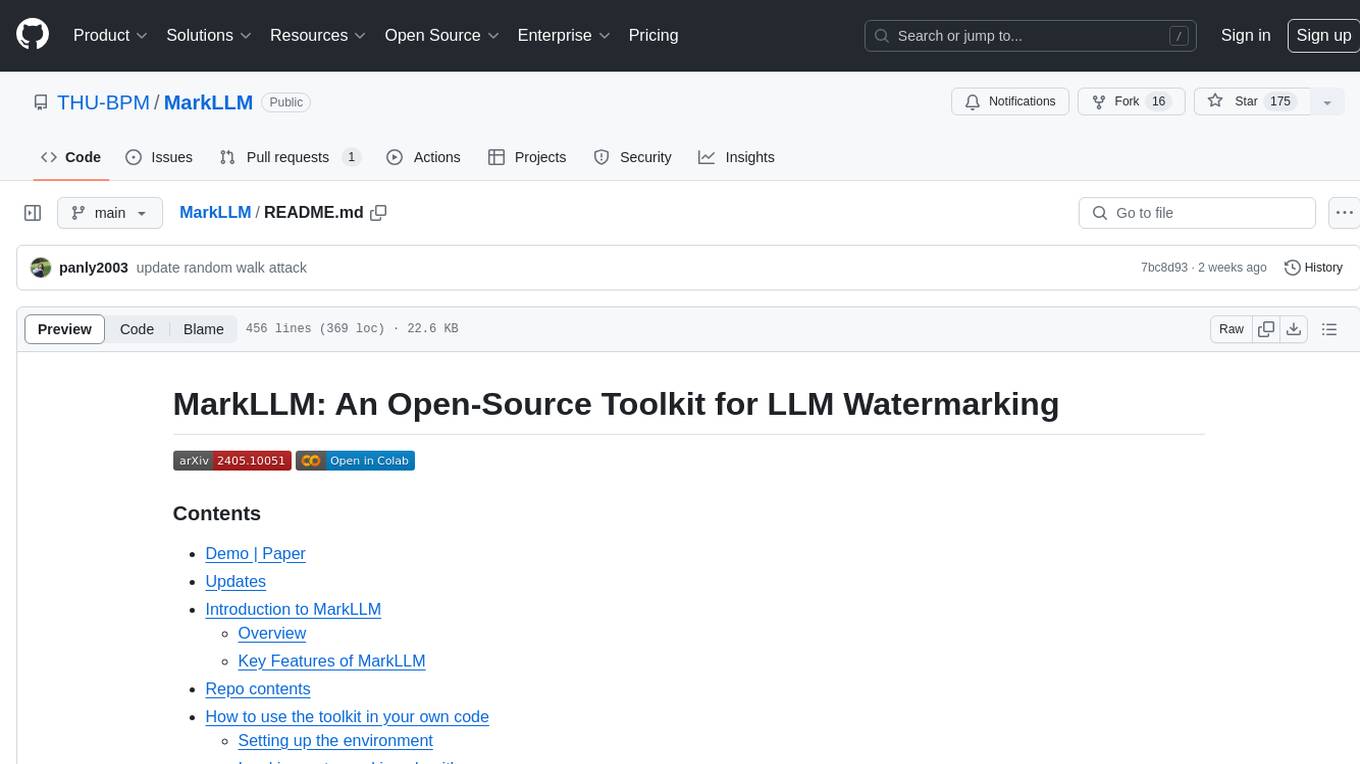
MarkLLM
MarkLLM is an open-source toolkit designed for watermarking technologies within large language models (LLMs). It simplifies access, understanding, and assessment of watermarking technologies, supporting various algorithms, visualization tools, and evaluation modules. The toolkit aids researchers and the community in ensuring the authenticity and origin of machine-generated text.
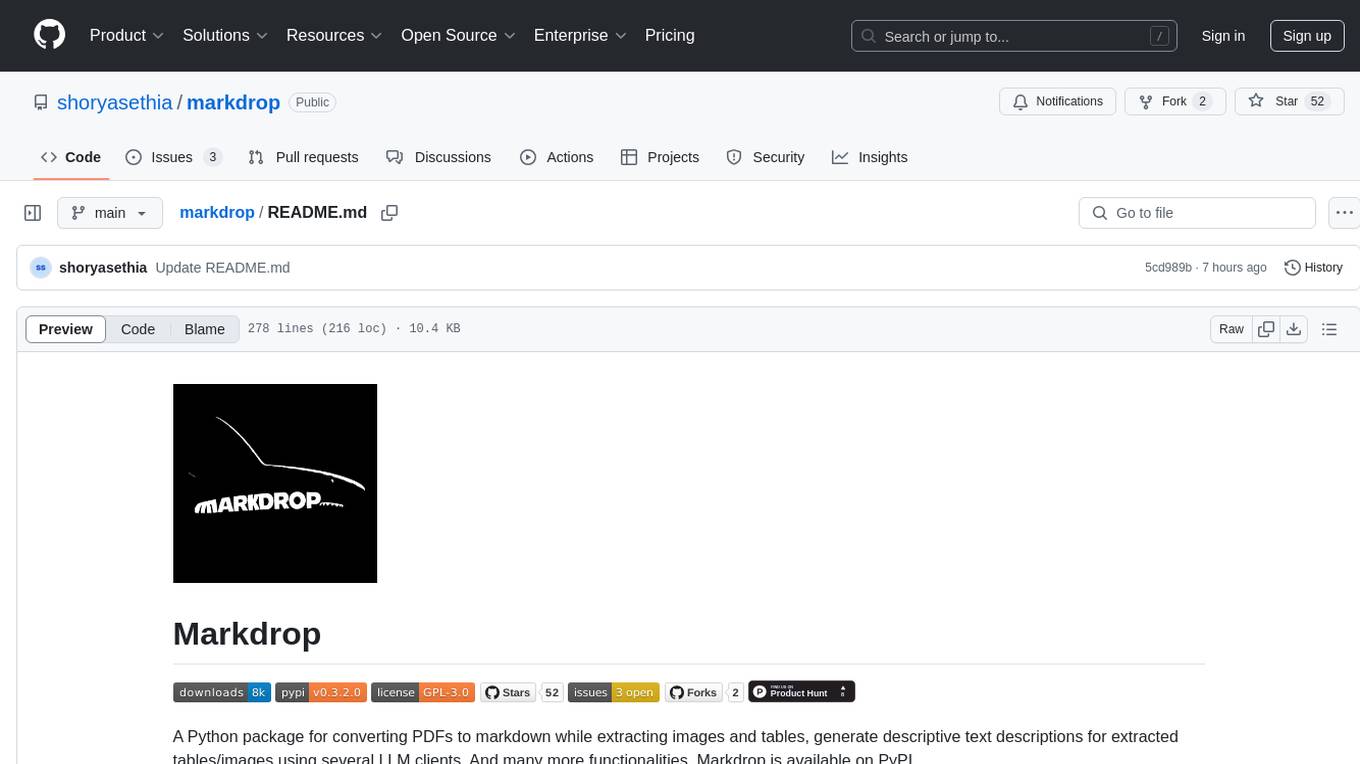
markdrop
Markdrop is a Python package that facilitates the conversion of PDFs to markdown format while extracting images and tables. It also generates descriptive text descriptions for extracted tables and images using various LLM clients. The tool offers additional functionalities such as PDF URL support, AI-powered image and table descriptions, interactive HTML output with downloadable Excel tables, customizable image resolution and UI elements, and a comprehensive logging system. Markdrop aims to simplify the process of handling PDF documents and enhancing their content with AI-generated descriptions.
pixeltable
Pixeltable is a Python library designed for ML Engineers and Data Scientists to focus on exploration, modeling, and app development without the need to handle data plumbing. It provides a declarative interface for working with text, images, embeddings, and video, enabling users to store, transform, index, and iterate on data within a single table interface. Pixeltable is persistent, acting as a database unlike in-memory Python libraries such as Pandas. It offers features like data storage and versioning, combined data and model lineage, indexing, orchestration of multimodal workloads, incremental updates, and automatic production-ready code generation. The tool emphasizes transparency, reproducibility, cost-saving through incremental data changes, and seamless integration with existing Python code and libraries.
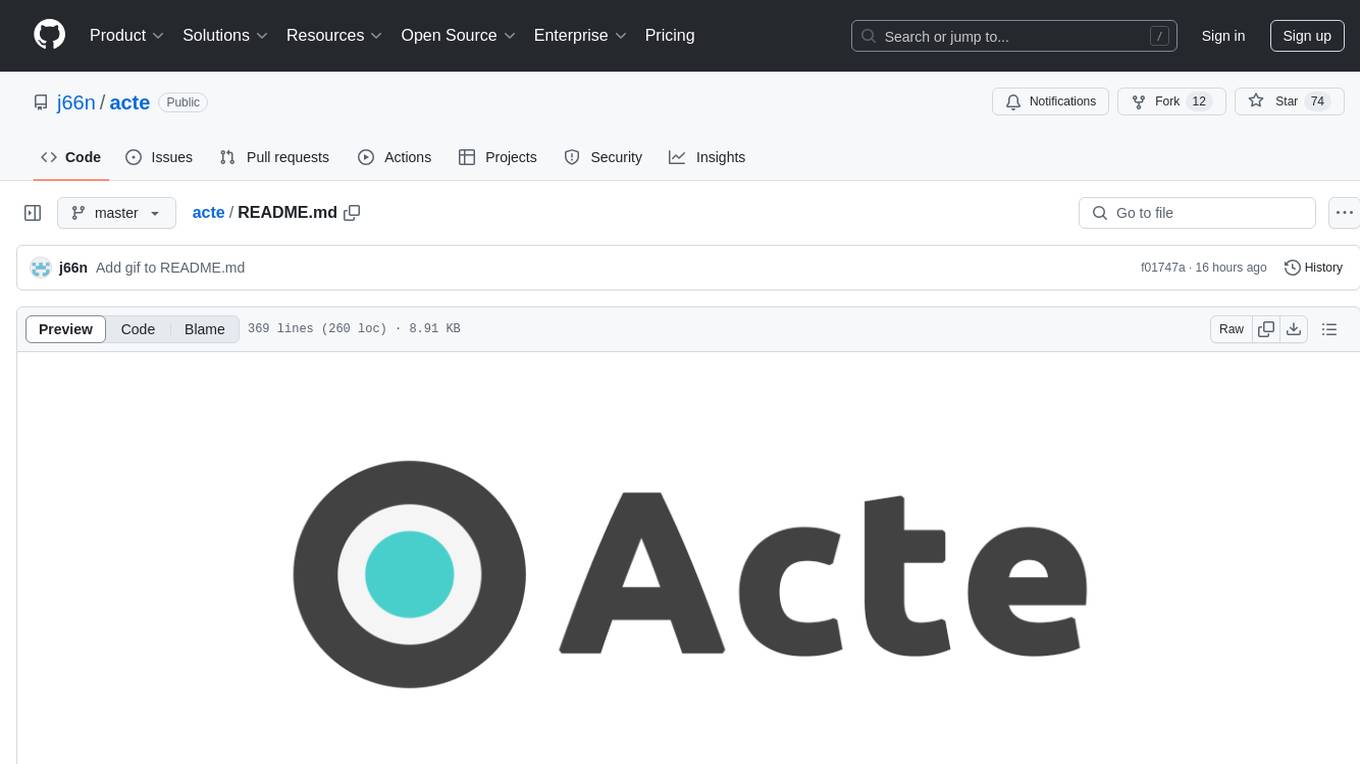
acte
Acte is a framework designed to build GUI-like tools for AI Agents. It aims to address the issues of cognitive load and freedom degrees when interacting with multiple APIs in complex scenarios. By providing a graphical user interface (GUI) for Agents, Acte helps reduce cognitive load and constraints interaction, similar to how humans interact with computers through GUIs. The tool offers APIs for starting new sessions, executing actions, and displaying screens, accessible via HTTP requests or the SessionManager class.
For similar tasks

educhain
Educhain is a powerful Python package that leverages Generative AI to create engaging and personalized educational content. It enables users to generate multiple-choice questions, create lesson plans, and support various LLM models. Users can export questions to JSON, PDF, and CSV formats, customize prompt templates, and generate questions from text, PDF, URL files, youtube videos, and images. Educhain outperforms traditional methods in content generation speed and quality. It offers advanced configuration options and has a roadmap for future enhancements, including integration with popular Learning Management Systems and a mobile app for content generation on-the-go.
For similar jobs

LLMStack
LLMStack is a no-code platform for building generative AI agents, workflows, and chatbots. It allows users to connect their own data, internal tools, and GPT-powered models without any coding experience. LLMStack can be deployed to the cloud or on-premise and can be accessed via HTTP API or triggered from Slack or Discord.

daily-poetry-image
Daily Chinese ancient poetry and AI-generated images powered by Bing DALL-E-3. GitHub Action triggers the process automatically. Poetry is provided by Today's Poem API. The website is built with Astro.

exif-photo-blog
EXIF Photo Blog is a full-stack photo blog application built with Next.js, Vercel, and Postgres. It features built-in authentication, photo upload with EXIF extraction, photo organization by tag, infinite scroll, light/dark mode, automatic OG image generation, a CMD-K menu with photo search, experimental support for AI-generated descriptions, and support for Fujifilm simulations. The application is easy to deploy to Vercel with just a few clicks and can be customized with a variety of environment variables.

SillyTavern
SillyTavern is a user interface you can install on your computer (and Android phones) that allows you to interact with text generation AIs and chat/roleplay with characters you or the community create. SillyTavern is a fork of TavernAI 1.2.8 which is under more active development and has added many major features. At this point, they can be thought of as completely independent programs.

Twitter-Insight-LLM
This project enables you to fetch liked tweets from Twitter (using Selenium), save it to JSON and Excel files, and perform initial data analysis and image captions. This is part of the initial steps for a larger personal project involving Large Language Models (LLMs).

AISuperDomain
Aila Desktop Application is a powerful tool that integrates multiple leading AI models into a single desktop application. It allows users to interact with various AI models simultaneously, providing diverse responses and insights to their inquiries. With its user-friendly interface and customizable features, Aila empowers users to engage with AI seamlessly and efficiently. Whether you're a researcher, student, or professional, Aila can enhance your AI interactions and streamline your workflow.

ChatGPT-On-CS
This project is an intelligent dialogue customer service tool based on a large model, which supports access to platforms such as WeChat, Qianniu, Bilibili, Douyin Enterprise, Douyin, Doudian, Weibo chat, Xiaohongshu professional account operation, Xiaohongshu, Zhihu, etc. You can choose GPT3.5/GPT4.0/ Lazy Treasure Box (more platforms will be supported in the future), which can process text, voice and pictures, and access external resources such as operating systems and the Internet through plug-ins, and support enterprise AI applications customized based on their own knowledge base.

obs-localvocal
LocalVocal is a live-streaming AI assistant plugin for OBS that allows you to transcribe audio speech into text and perform various language processing functions on the text using AI / LLMs (Large Language Models). It's privacy-first, with all data staying on your machine, and requires no GPU, cloud costs, network, or downtime.


